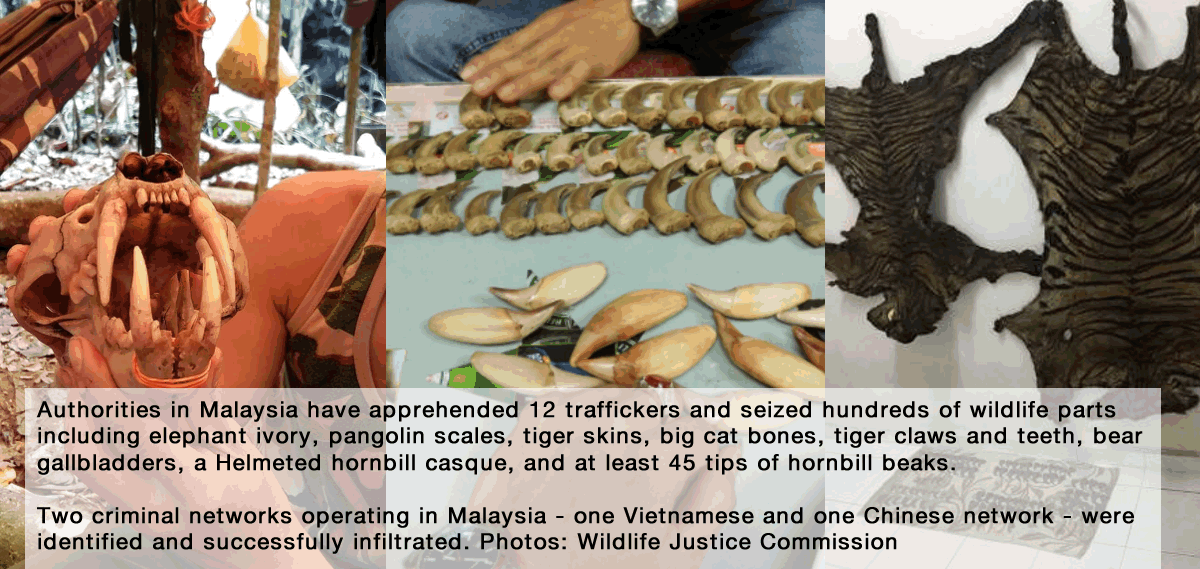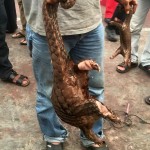
Authorities in Malaysia have apprehended 12 traffickers and seized hundreds of wildlife parts including elephant ivory, pangolin scales, tiger skins, big cat bones, tiger claws and teeth, bear gallbladders, a Helmeted hornbill casque, and at least 45 tips of hornbill beaks.
Two criminal networks operating in Malaysia – one Vietnamese and one Chinese network – were identified and successfully infiltrated. The investigation – called Operation Chameleon – was the result of a collaboration between the Wildlife Justice Commission and Malaysia’s Department of Wildlife and National Parks (Perhilitan).
Among those arrested is a Chinese national previously convicted of smuggling ivory through Kuala Lumpur International Airport in 2013.
The raids took place in five locations near the country’s capital Kuala Lumpur. Two Malaysians, two Chinese and eight Vietnamese nationals were arrested. Authorities reported that some of the suspects did not have valid documentation even to be in the country.
“This success is a result of months of surveillance, international co-operation and information sharing, including with the Wildlife Justice Commission, since early this year,” said Perhilitan Director-General, Abdul Kadir Abu Hashim, at a press conference. “The Department is firmly committed to eradicating this crime and urge those with information on wildlife crime to come forward.”
Olivia Swaak-Goldman, Executive Director, Wildlife Justice Commission, said: “We are delighted by the outcome of these two operations with Perhilitan. In addition to the seizures, arrests and impact on these two networks, it is fantastic to be strengthening our partnership with Perhilitan.
“Sharing of information and communication between Perhilitan and the Wildlife Justice Commission investigators was critical to the success of these operations.”
The ivory seizures were of particular significance as Malaysia has no known domestic ivory market and has largely been identified as a transit point in the global illegal ivory trade.
“We congratulate Perhilitan on this significant bust. The fact that ivory was found in three separate premises is very worrying, suggesting an organized ivory smuggling racket is present in Malaysia,” said Kanitha Krishnasamy, Senior Programme Manager for TRAFFIC in Southeast Asia.
“For repeat offenders who have no respect for our laws, nothing sends a stronger message than stiff jail time.”
The haul of hornbill parts also raised alarm. No known seizures of this magnitude involving hornbills have taken place previously in Malaysia. The items were found at a residence, along with the bag of pangolin scales. Demand for the ivory from Helmeted Hornbills in China has led to this species being recently assessed by IUCN as Critically Endangered – a step away from extinction. Of concern were the many tips of hornbill beaks, which do not contain ivory – the reasons for these being in trade is not known.
Krishnasamy applauded the authorities’ continued vigilance and urged them to continue investigating the links between the suspects in the five cases and their networks in the country.
“The involvement of foreign nationals is another concern, so we urge the authorities to maintain a blacklist of wildlife offenders at the country’s land borders and other entry and exit points.”
Perhilitan’s forensics lab will be conducting DNA testing on the seized items to determine their origins.




![China’s Tiger Trade Conspiracy [Podcast]](https://annamiticus.com/wp-content/uploads/2015/12/BehindTheSchemesEpisode39-150x150.png)